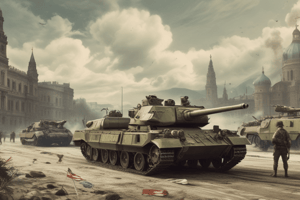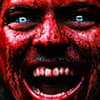Podcast
Questions and Answers
What was the major turning point in the Cold War?
What was the major turning point in the Cold War?
- The Cuban Missile Crisis (correct)
- The power struggle between the United States and the Soviet Union
- The formation of the Warsaw Pact
- The establishment of North Atlantic Treaty Organization (NATO)
Which event led to the imposition of a naval blockade of Cuba by the United States?
Which event led to the imposition of a naval blockade of Cuba by the United States?
- The power struggle between the United States and the Soviet Union
- The formation of the Warsaw Pact
- The discovery of nuclear missiles in Cuba by the United States (correct)
- The formation of North Atlantic Treaty Organization (NATO)
What was the main ideological difference between the United States and the Soviet Union during the Cold War?
What was the main ideological difference between the United States and the Soviet Union during the Cold War?
- Neither country had a defined ideology
- Both countries followed similar ideologies
- The United States was a capitalist democracy, while the Soviet Union was a communist state (correct)
- The United States was a communist state, while the Soviet Union was a capitalist democracy
Which organization did the Soviet Union form during the Cold War to strengthen its position?
Which organization did the Soviet Union form during the Cold War to strengthen its position?
When did the Cold War begin?
When did the Cold War begin?
What was the Soviet Union's agreement to remove missiles from Cuba in exchange for?
What was the Soviet Union's agreement to remove missiles from Cuba in exchange for?
What were the characteristics of Capitalism?
What were the characteristics of Capitalism?
What was the significance of Japan in the text?
What was the significance of Japan in the text?
Who was idolized by Avtar as a communist leader in the text?
Who was idolized by Avtar as a communist leader in the text?
What was the role of McNamara in Kennedy's administration according to the text?
What was the role of McNamara in Kennedy's administration according to the text?
Study Notes
- The text is a note summarizing key points from a political science chapter about the Cold War and World War II.
- The Cold War began in 1945, following World War II, between the Soviet Union (Russia) and the United States, with other countries also involved, including France and Great Britain.
- The two major powers, the United States and the Soviet Union, engaged in a power struggle, with each trying to establish dominance over the other.
- The United States and the Soviet Union had differing ideologies: the United States was a capitalist democracy, while the Soviet Union was a communist state.
- The two powers each had significant economies and military capabilities.
- Both sides established alliances with other countries to strengthen their positions: the United States formed the North Atlantic Treaty Organization (NATO), while the Soviet Union formed the Warsaw Pact.
- Confrontations between the two sides occurred frequently, including the Cuban Missile Crisis, which was a major turning point in the Cold War.
- The Cuban Missile Crisis occurred in 1962, when the United States discovered that the Soviet Union had placed nuclear missiles in Cuba, just 90 miles off the coast of the United States.
- The United States responded by imposing a naval blockade of Cuba and demanding that the Soviet Union remove the missiles.
- The Soviet Union, under pressure from the United States and other countries, eventually agreed to remove the missiles in exchange for a US promise not to invade Cuba and to remove US missiles from Turkey.
- The Cold War lasted until the late 1980s, when the Soviet Union began to experience economic and political instability, leading to its eventual collapse.
- The United States emerged as a superpower after World War II and the Cold War, with a strong economy and military capability.
- The text also mentions Japan, which was a major power during World War II and a significant economic power after the war.
- The text also mentions the importance of diplomacy and negotiations in resolving conflicts between nations.
- The text suggests that understanding the historical context of events is important for making sense of complex issues.- Avtar was an influential figure in the US military and economy during the Kennedy administration.
- He was a financier and economic advisor who provided military and financial help to Cuba, offering both money and weapons.
- He followed Castro idolizing him as a communist leader, even offering to take him brother to his side during the Bay of Pigs invasion in 1961.
- Kennedy appointed McNamara, a Democrat and proponent of private property, as Secretary of Defense, while also promoting public housing projects.
- During this time, Counterfeit U.S. currency was a significant issue, with Democrats and Capitalists following the Vice President and Capitalist Weston A. Hanson, who was a major follower of Socialism and Communism.
- The Social Media and Communism followed the Soviet Union, with social media channels like the East Line and It Was Committed to Social Democracy.
- Capitalism is a system of government where the government has control over most aspects, and individuals have private property and freedom.
- Socialism, on the other hand, is a totalitarian system of government where the government controls everything.
- The Soviet Union, under the leadership of Nikita Khrushchev, was a major power during this time, and the US sought to counteract its influence.
- Kennedy wanted the US to lead and sought to counter the influence of the Soviet Union through both the private and public sectors.
- Kennedy's administration was a mix of Democrats and Capitalists, with the former promoting public housing projects and the latter advocating for individual property rights.
- The issue of counterfeit U.S. currency was a significant concern during this time, with both Democrats and Capitalists following different leaders and policies to address it.
- McNamara, as Secretary of Defense, oversaw a significant reduction in military spending and the implementation of new military technologies.
- Meanwhile, the Soviet Union continued to be a major power, with Khrushchev pursuing a policy of peaceful coexistence with the US.
- The Bay of Pigs invasion, led by Cuban exiles, failed dismally, and the Kennedy administration was heavily criticized for its handling of the situation.
- Kennedy's administration faced numerous challenges during his tenure, including the issue of counterfeit U.S. currency, the Soviet Union's military build-up, and the Cuban Missile Crisis.
- Despite these challenges, Kennedy pursued a bold and ambitious agenda, seeking to counter the influence of the Soviet Union and promote American interests around the world.
- Kennedy's leadership style was characterized by a commitment to both the public and private sectors, and his administration was a mix of Democrats and Capitalists.
- Kennedy's administration faced numerous criticisms and challenges, including the failure of the Bay of Pigs invasion and the Cuban Missile Crisis, but he remained committed to his goals and left a lasting legacy.
Studying That Suits You
Use AI to generate personalized quizzes and flashcards to suit your learning preferences.
Description
Test your knowledge of key events, figures, and ideologies related to the Cold War, World War II, and the political dynamics of the time, including the Cuban Missile Crisis, leadership roles, and ideologies of the United States and the Soviet Union.





